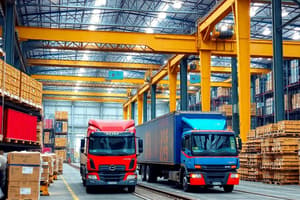Podcast
Questions and Answers
What are the primary objectives of transport management?
What are the primary objectives of transport management?
The primary objectives are to ensure timely delivery, minimize costs, maximize efficiency, and enhance customer satisfaction.
Explain the role of logistics management in transport management.
Explain the role of logistics management in transport management.
Logistics management integrates transportation with warehousing, inventory management, and supply chain operations.
List two advantages and one disadvantage of using air transportation.
List two advantages and one disadvantage of using air transportation.
Advantages include speed and suitability for perishable goods; a disadvantage is the high costs.
What is fleet management and why is it important?
What is fleet management and why is it important?
Describe the significance of route planning in transport management.
Describe the significance of route planning in transport management.
Identify two challenges faced in transport management.
Identify two challenges faced in transport management.
How does technology utilization improve transport management?
How does technology utilization improve transport management?
What performance metric can indicate the efficiency of a transportation operation?
What performance metric can indicate the efficiency of a transportation operation?
What is the impact of demand variability on transport management?
What is the impact of demand variability on transport management?
What future trends are expected to influence transport management?
What future trends are expected to influence transport management?
Flashcards are hidden until you start studying
Study Notes
Key Concepts in Transport Management
-
Definition: Transport management involves planning, executing, and optimizing the movement of goods and services from one location to another.
-
Objectives:
- Ensure timely delivery
- Minimize costs
- Maximize efficiency
- Enhance customer satisfaction
Components of Transport Management
-
Transportation Modes:
- Road: Trucks, vans; flexible but subject to traffic.
- Rail: Cost-effective for bulk goods; limited routes.
- Air: Fastest mode; high costs; ideal for perishable goods.
- Sea: Suitable for international trade; slower but cost-effective for large volumes.
- Pipeline: Used for liquids and gases; efficient for continuous flow.
-
Logistics Management:
- Integration of transportation with warehousing, inventory management, and supply chain operations.
-
Fleet Management:
- Involves maintenance, tracking, and optimization of vehicle use.
-
Route Planning:
- Utilizing software tools for efficient route selection to reduce transit times and costs.
-
Regulatory Compliance:
- Adhering to local, national, and international transport regulations and standards.
Key Strategies
-
Cost Management:
- Analyze and control transportation costs through budgeting and performance metrics.
-
Technology Utilization:
- Use of Transport Management Systems (TMS) for tracking, scheduling, and reporting.
- Implementation of GPS and RFID for real-time tracking.
-
Sustainability Practices:
- Adoption of eco-friendly transportation options and practices to reduce carbon footprint.
Challenges in Transport Management
- Traffic Congestion: Affects delivery times and increases operational costs.
- Regulatory Changes: Frequent updates in laws can complicate compliance.
- Demand Variability: Fluctuations in demand can lead to inefficiencies.
- Rising Fuel Costs: Impact the overall budget and pricing strategies.
Performance Metrics
- On-time Delivery Rate: Percentage of deliveries made on schedule.
- Cost per Mile/Kilometer: A measure of cost efficiency in transport.
- Vehicle Utilization: Ratio of actual miles driven to available miles.
- Customer Satisfaction: Feedback and ratings from customers regarding delivery services.
Future Trends
- Automation: Increasing use of autonomous vehicles and drones for deliveries.
- Big Data Analytics: Leveraging data for better decision-making and predictive analysis.
- E-commerce Growth: Adapting transport strategies to meet the demands of online retail.
Conclusion
Effective transport management is crucial for operational efficiency and customer satisfaction. By understanding the various components, strategies, and challenges, organizations can optimize their transport operations.
Key Concepts in Transport Management
- Transport management encompasses the planning, execution, and optimization of goods and services movement.
- Primary objectives include timely delivery, cost minimization, efficiency maximization, and enhanced customer satisfaction.
Components of Transport Management
-
Transportation Modes:
- Road: Trucks and vans are flexible, though susceptible to traffic delays.
- Rail: Economical for bulk goods; limited by rail network availability.
- Air: Fastest transport option; higher cost; best for perishables.
- Sea: Ideal for international shipping; slower but economical for large volumes.
- Pipeline: Efficient for transporting liquids and gases.
-
Logistics Management: Involves integrating transportation with warehousing, inventory control, and supply chain scenarios.
-
Fleet Management: Focuses on vehicle maintenance, tracking efficiency, and utilization optimization.
-
Route Planning: Software tools are used to select efficient routes, reducing time and costs.
-
Regulatory Compliance: Requires adhering to transport regulations at local, national, and international levels.
Key Strategies
- Cost Management: Involves analyzing transport costs via budgeting and performance metrics.
- Technology Utilization: Transport Management Systems (TMS) enhance tracking and scheduling, while GPS and RFID enable real-time shipment tracking.
- Sustainability Practices: Emphasizes the adoption of environmentally friendly transport methods to lower carbon footprints.
Challenges in Transport Management
- Traffic Congestion: Leads to delayed deliveries and increased operational costs.
- Regulatory Changes: Continuous legal updates can create compliance hurdles.
- Demand Variability: Fluctuating demand causes operational inefficiencies.
- Rising Fuel Costs: Directly affect budget management and pricing strategies.
Performance Metrics
- On-time Delivery Rate: Measures the percentage of timely deliveries made.
- Cost per Mile/Kilometer: Evaluates cost efficiency in transport operations.
- Vehicle Utilization: Ratio of actual miles driven compared to available miles for maximum efficiency.
- Customer Satisfaction: Assesses service quality through customer feedback and ratings.
Future Trends
- Automation: Growing trend of utilizing autonomous vehicles and drones for delivery processes.
- Big Data Analytics: Employs data for improved decision-making and predictive capabilities in transport.
- E-commerce Growth: Necessitates adapting transport strategies to align with the demands of online retail.
Conclusion
Effective transport management is vital for operational efficiency and nurturing customer satisfaction through various components, strategies, and awareness of challenges.
Studying That Suits You
Use AI to generate personalized quizzes and flashcards to suit your learning preferences.




